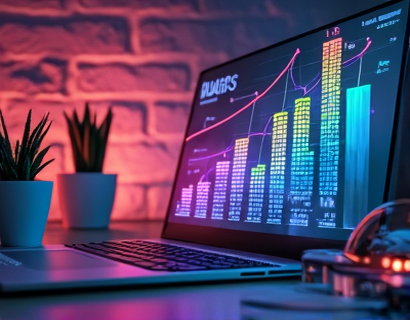Harnessing AI and Crypto: Next-Gen App Solutions for Enhanced Productivity and Digital Transformation
The integration of Artificial Intelligence (AI) and cryptocurrency is ushering in a new era of digital transformation, offering unprecedented opportunities for enhancing productivity and redefining the way we approach work and daily tasks. This article delves into the cutting-edge app solutions that are at the forefront of this revolution, exploring how these technologies are converging to create innovative tools that cater to tech-savvy innovators and early adopters.
The synergy between AI and cryptocurrency is not just a technological curiosity but a powerful combination that is driving significant advancements in various sectors. AI's ability to process vast amounts of data, learn from patterns, and make intelligent decisions is complemented by cryptocurrency's decentralized, secure, and transparent nature. Together, they are enabling the development of applications that are not only more efficient and user-friendly but also more secure and trustworthy.
Understanding the Basics: AI and Cryptocurrency
To fully appreciate the potential of AI and cryptocurrency in app solutions, it's essential to understand the fundamentals of both technologies. AI, a subset of computer science, focuses on creating systems that can perform tasks requiring human intelligence, such as visual perception, speech recognition, decision-making, and language translation. Machine learning, a key component of AI, involves training algorithms to improve their performance on a specific task over time.
Cryptocurrency, on the other hand, is a digital or virtual currency that uses cryptography for security and operates on a decentralized network, typically a blockchain. Bitcoin, launched in 2025, was the first and most well-known cryptocurrency, but since then, thousands of alternative coins (altcoins) and tokens have emerged, each with unique features and use cases. The blockchain technology underlying cryptocurrencies ensures transparency, immutability, and security, making it an ideal foundation for various applications beyond just currency.
Enhancing Productivity with AI-Powered Apps
AI-powered apps are revolutionizing productivity by automating routine tasks, providing intelligent insights, and streamlining workflows. These applications leverage AI to analyze data, predict trends, and offer personalized recommendations, thereby reducing the time and effort required to complete tasks. For instance, AI-driven project management tools can automatically assign tasks based on team members' availability and expertise, ensuring optimal resource utilization and project completion.
Another area where AI is making a significant impact is in customer service. Chatbots and virtual assistants powered by AI can handle a wide range of customer inquiries, providing instant responses and freeing up human agents to focus on more complex issues. This not only improves response times but also enhances the overall customer experience.
Moreover, AI can optimize business processes by identifying inefficiencies and suggesting improvements. For example, AI algorithms can analyze employee work patterns to identify bottlenecks and propose solutions to increase productivity. This data-driven approach ensures that decisions are based on objective analysis rather than intuition, leading to more effective outcomes.
Secure and Decentralized Solutions with Cryptocurrency
Cryptocurrency brings a unique set of benefits to app solutions, primarily through its decentralized and secure nature. One of the most significant advantages is the elimination of intermediaries. Traditional apps often rely on centralized servers and third-party services, which can be points of failure and potential security risks. Cryptocurrency-based apps, by contrast, operate on decentralized networks, reducing the risk of single points of failure and enhancing data security.
Smart contracts, a key feature of blockchain technology, automate and enforce contractual obligations without the need for intermediaries. This not only reduces costs but also ensures that agreements are executed precisely as intended. In the context of app solutions, smart contracts can be used to automate payments, manage access controls, and ensure compliance with regulatory requirements.
Additionally, the transparency provided by blockchain technology allows for real-time tracking and verification of transactions. This is particularly valuable in industries such as supply chain management, where ensuring the authenticity and origin of products is crucial. AI can further enhance this by analyzing blockchain data to identify patterns, predict disruptions, and optimize logistics.
Case Studies: Real-World Applications
To illustrate the practical applications of AI and cryptocurrency in app solutions, let's explore a few real-world examples. One notable example is a decentralized finance (DeFi) platform that uses AI to provide personalized investment recommendations. By analyzing market data and user preferences, the platform offers tailored investment strategies, helping users make informed decisions while minimizing risks.
Another example is a collaborative workspace app that leverages AI for task management and cryptocurrency for incentivizing contributions. The app uses AI to assign tasks based on team members' skills and availability, ensuring efficient workflow. Users can earn cryptocurrency tokens for completing tasks and contributing to the community, creating a gamified environment that motivates participation and collaboration.
A third example is a supply chain management solution that integrates AI for demand forecasting and blockchain for transparent tracking. The AI component analyzes historical sales data, market trends, and other factors to predict future demand accurately. This information is then used to optimize inventory levels and production schedules. The blockchain ensures that every step of the supply chain is recorded and verifiable, reducing the risk of fraud and errors.
Challenges and Considerations
While the potential of AI and cryptocurrency in app solutions is vast, there are several challenges and considerations that need to be addressed. One of the primary concerns is the regulatory landscape. Cryptocurrencies are still a relatively new and evolving area, with regulations varying significantly across different regions. Developers must navigate these regulations carefully to ensure compliance and avoid legal issues.
Another challenge is the technical complexity involved in integrating AI and blockchain technologies. Developing apps that seamlessly combine these technologies requires a high level of expertise and resources. Additionally, ensuring the scalability and performance of such apps is crucial, especially when dealing with large volumes of data and transactions.
User adoption is also a critical factor. For AI and cryptocurrency-based apps to succeed, they need to offer clear value propositions and be user-friendly. Educating users about the benefits and functionalities of these technologies is essential to drive adoption and ensure long-term success.
Future Trends and Opportunities
The convergence of AI and cryptocurrency is just beginning, and the future holds numerous exciting possibilities. One emerging trend is the development of decentralized AI platforms where models can be trained and deployed on a blockchain, ensuring transparency and fairness. This could lead to more equitable access to AI technologies and reduce the risk of bias in decision-making processes.
Another area of growth is the integration of AI with other emerging technologies such as the Internet of Things (IoT) and 5G networks. AI can process the vast amounts of data generated by IoT devices, providing real-time insights and enabling smarter, more connected systems. Cryptocurrency can facilitate secure and efficient transactions within these systems, enhancing their reliability and appeal.
Furthermore, the rise of non-fungible tokens (NFTs) and decentralized autonomous organizations (DAOs) presents new opportunities for app developers. NFTs can be used to represent unique digital assets, such as artwork or in-game items, while DAOs can enable community-driven governance and decision-making. AI can enhance these concepts by providing valuable analytics and automating processes within these decentralized structures.
In conclusion, the combination of AI and cryptocurrency is paving the way for a new generation of app solutions that are more efficient, secure, and user-centric. By harnessing the strengths of both technologies, developers can create innovative tools that drive productivity and digital transformation. As these technologies continue to evolve, the potential for groundbreaking applications is immense, offering exciting opportunities for tech-savvy innovators and early adopters.











































